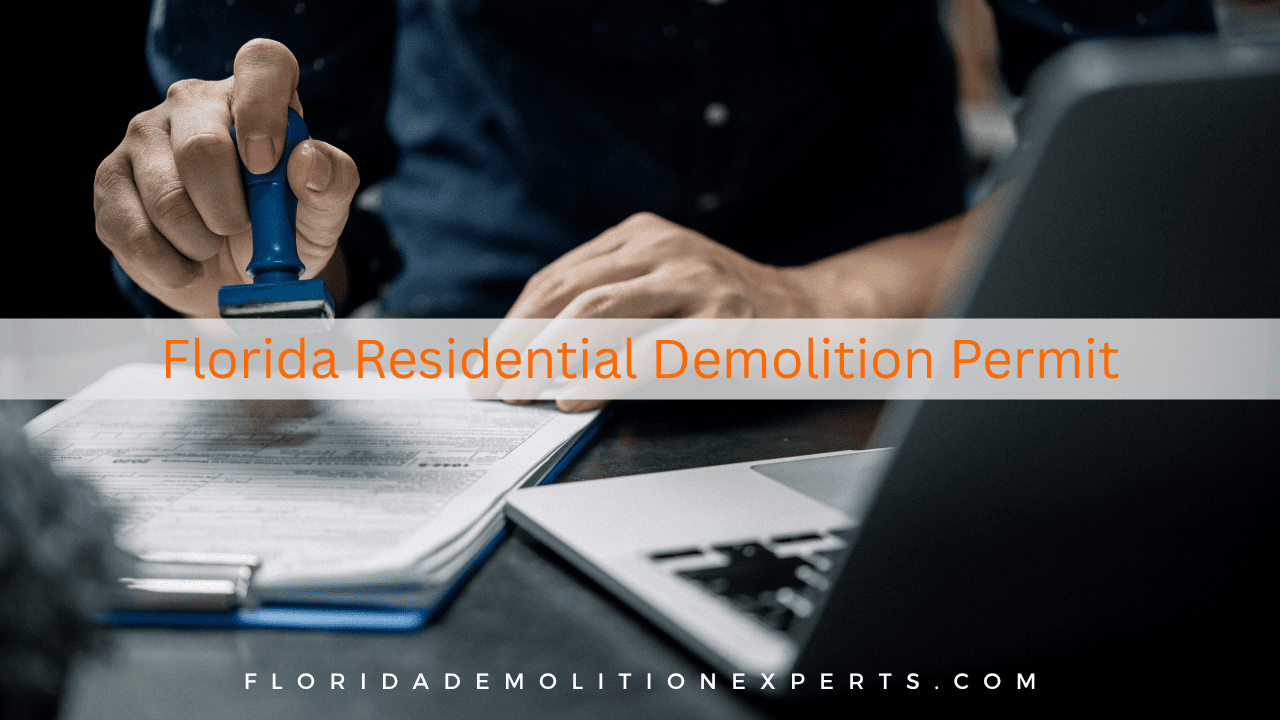Are you planning to demolish a house in Florida? Understanding the residential demolition process is critical to a smooth and compliant project, whether you’re dealing with an aging structure, safety hazards, or redevelopment goals.
This comprehensive guide walks you through every stage of residential demolition in Florida, from inspection to site cleanup, with insights specific to Florida’s laws, costs, safety practices, and environmental regulations.
What Is Residential Demolition?
Residential demolition in Florida refers to the controlled removal of a residential structure, either partially or completely, to prepare the property for renovation, rebuilding, or land redevelopment. The process includes structural teardown, debris removal, environmental safety checks, and compliance with Florida-specific demolition regulations.
In Florida, residential demolition is commonly required due to hurricane damage, aging structures, foundation failure, fire damage, or major remodeling projects.
Due to strict state and county regulations, demolition must be performed by licensed professionals who understand local permitting requirements, environmental laws, and safety standards.
When Is Residential Demolition Necessary?
Residential demolition in Florida is commonly required in the following situations:
-
Severe hurricane or storm damage
-
Fire-damaged or structurally unsafe homes
-
Homes with major foundation or framing failure
-
Properties scheduled for complete rebuilding
-
Renovation projects requiring partial structure removal
-
Abandoned or condemned residential buildings
In many cases, demolition is the most cost-effective and safest option compared to extensive structural repairs.
How Residential Demolition Works in Florida (Step-by-Step)
Residential demolition in Florida typically follows a structured process designed to ensure safety, legal compliance, and efficient site preparation:
1. Initial Inspection & Property Assessment
Before demolition begins, a licensed contractor or structural engineer performs an on-site inspection. This includes:
- Checking the building’s structural integrity
- Identifying asbestos, lead paint, or mold
- Reviewing zoning laws and flood zone status
- Assessing access for heavy machinery
- Estimating volume and type of debris to be removed
Elevation certificates and environmental impact reviews may also be required in coastal areas such as Miami-Dade and Tampa.
2. Obtain Necessary Permits
You cannot legally demolish a home in Florida without proper permits. Requirements vary by county and municipality, but typically include:
- Site plans showing existing structures
- Utility disconnection confirmations
- Hazardous materials reports
- Notice to adjacent property owners (for tight urban lots)
- Submission of contractor license and insurance documents
Permit fees typically range from $100 to $500, and the approval process takes 7–10 business days. Approval from heritage boards may be necessary for historical buildings.
3. Disconnect Utilities
Demolition permits must be obtained from the local building authority. All utilities, including electricity, gas, water, and sewer lines, are safely disconnected before demolition begins.
4. Remove Hazardous Materials (If Any)
Florida law mandates that any property built before 1980 must be inspected for asbestos and lead-based paint. If found, a licensed abatement company must safely remove and dispose of these materials before structural demolition begins.
This step involves:
- Sealing off contaminated zones
- Wearing protective suits and using HEPA filtration
- Coordinating disposal with approved hazardous waste facilities
5. Site Preparation & Equipment Mobilization
Before demolition:
- Temporary fencing is erected
- Permits and warning signage are posted
- Equipment (excavators, dumpsters, skid steers) is brought onsite
- Access points for machinery are cleared
Tree removal or soil testing may be needed, depending on redevelopment plans.
6. Debris Sorting, Recycling & Disposal
After the structure is down:
- Debris is sorted into concrete, metal, wood, etc.
- Recyclable materials (steel, brick, wood) are transported to recycling centers.
- Hazardous materials are double-checked for safe removal
- All waste is disposed of by the Florida Department of Environmental Protection (FDEP) regulations
Using roll-off dumpsters and proper transport documentation is mandatory.
7. Site Cleanup & Grading
After demolition is complete, the site is cleared, graded, and prepared for new construction, landscaping, or property transfer.
How Long Does Residential Demolition Take?
The timeline varies depending on the following: See our detailed guide on the demolition timeline.
- Property size
- Type of demolition
- Permit approval times
- Weather (especially in hurricane season)
Average timeline:
- Permits: 1–2 weeks
- Demolition: 3–7 days
- Cleanup: 1–3 days
Total: 2 to 3 weeks for most single-family homes.
How Much Does Residential Demolition Cost in Florida?
Florida’s average residential demolition cost ranges from $6 to $15 per square foot. Here’s what affects pricing:
- Home Size: Larger square footage = higher demolition cost.
- Material Complexity: Concrete, brick, or asbestos materials are harder to remove.
- Hazardous Materials: Asbestos and lead require certified handling.
- Permit Fees: Vary by county; generally $100–$500.
- Debris Disposal: Includes tipping fees and transportation costs.
- Accessibility: Challenging access may require specialty equipment or manual labor.
Specific Answer: On average, it costs between $10,000 and $25,000 to demolish a typical single-family home in Florida, depending on the size and complexity.
Need a personalized estimate? Florida Demolition Experts provides fast, accurate quotes for any residential property.
Florida-Specific Demolition Considerations
- Hurricane zones: Must follow stricter FEMA and wind-load codes.
- Flood zones: May require elevation or fill after demolition.
- Historic homes: Subject to review boards and may face permit delays.
- HOA communities: Additional approval may be needed from homeowners’ associations.
Do I Need a Permit for Home Demolition in Florida?
Yes, a demolition permit is required. Skipping this step can result in fines or legal delays. Most Florida municipalities require the following:
- Site plans with market structures
- Confirmation of utility disconnections
- Asbestos survey if the structure predates 1980
- Contractor’s license and liability insurance
Approval generally takes 7–10 business days.
Specific Answer: All Florida cities and counties require a permit to demolish a residential property legally.
For a full breakdown, read our Guide to Florida Demolition Permits.
Types of Demolition Permits Required in Florida
Before you swing a hammer or bring in the excavator, there’s one crucial step you can’t skip in Florida: getting the proper demolition permit.
Whether you’re tearing down a backyard shed or a multi-story building, state and local laws require specific licenses to ensure the job is done safely, legally, and without risking neighboring properties.
Here’s a breakdown of the most common types of demolition permits you might need in Florida:
1. Standard Demolition Permit
This is the most common type of permit for residential or commercial demolitions. Your local city or county building department typically issues it.
You must submit detailed structural plans, proof of utility disconnection (water, gas, and electricity), and, in some cases, a site safety plan. This permit is required whether you’re doing a complete teardown or removing a portion of a building.
2. Partial Demolition Permit
You’ll need a partial demolition permit if you only remove part of a structure, such as interior walls, a garage, or a roof section.
These are usually required for renovations or additions in which some part of the building remains intact. However, inspections and safety clearances are still necessary, especially for structural elements.
3. Environmental or Asbestos-Related Permits
If your structure was built before 1980 in Florida, you may also need an asbestos inspection before demolition begins. If asbestos is found, an abatement (removal) permit is required to protect workers and the public from exposure to hazardous materials.
4. Historic Preservation Approval
If your property is in a historic district or listed on a historic registry, you might need special approval from your city’s preservation board. These rules protect buildings of cultural or historical value and may limit or prohibit their demolition.
5. Special Use or Coastal Area Permits
Special state or environmental permits may be needed in areas near the coast, wetlands, or hurricane zones. These are handled through the Florida Department of Environmental Protection or other local agencies and help protect sensitive ecosystems.
Should You Demolish or Renovate?
This is one of the most common dilemmas for Florida homeowners. Here are common reasons to choose demolition:
- Repair costs exceed the new construction budget
- The home layout is outdated beyond reconfiguration
- Foundation issues or sinking slabs
- Presence of mold, pests, or structural rot
- Redevelopment for multi-family units or larger custom builds
Demolition offers a fresh start and often results in higher long-term property value.
Still unsure? Read our article on signs your house should be demolished.
Types of Demolition
When tearing down a structure, not all demolition is the same. The method used depends on the building’s size, location, materials, and whether anything needs to be salvaged or reused. Generally, demolition falls into three main categories:
1. Manual Demolition
This is the most basic form of demolition, performed with hand tools such as hammers, crowbars, and sledgehammers. It’s typically used for smaller projects, such as knocking down a shed, removing interior walls, or partially dismantling parts of a building.
Manual demolition is slower and more labor-intensive, but it offers greater precision, especially when working in tight spaces or preserving surrounding structures.
2. Mechanical Demolition
Most people picture mechanical demolition when they think of tearing down a building. It involves using heavy equipment such as excavators, bulldozers, wrecking balls, and high-reach arms. This fast and efficient method makes it ideal for bringing down entire houses, commercial buildings, or large industrial structures.
Safety and speed are key advantages, but it does require careful planning and proper permits, especially in urban or densely populated areas.
3. Deconstruction (Selective Demolition)
Deconstruction, also known as selective demolition, is a more thoughtful approach that involves dismantling a building piece by piece to salvage reusable materials like wood, metal, fixtures, and even bricks. This method is often chosen when environmental sustainability or historic preservation is a priority.
It takes longer than mechanical demolition but offers the benefit of reducing waste and supporting recycling efforts. Many green building projects and renovations use this method to minimize environmental impact.
FAQ’s
How much does residential demolition cost in Florida?
Residential demolition costs in Florida typically range from $5,000 to $25,000, depending on property size, location, structure type, and disposal requirements. Partial demolitions may cost less, while complex projects involving hazardous materials may cost more.
How long does residential demolition take?
Most residential demolition projects in Florida take 3 to 7 days, excluding permit approval time. Larger homes or properties requiring environmental remediation may take longer.
Do I need a permit for residential demolition in Florida?
Yes. Florida law requires a demolition permit issued by the local building department. Additional permits may be needed for environmental clearance or historical properties.
Can demolition be done partially instead of tearing down the whole house?
Yes. Partial demolition is common for renovations or extensions. It involves removing specific sections of a structure while preserving the rest.
Is residential demolition safe?
When performed by licensed professionals in accordance with safety regulations, residential demolition is safe and controlled.
How to Choose the Right Residential Demolition Contractor
When choosing a demolition contractor, consider:
- License & Insurance: Florida law requires a certified contractor’s license for demolition over $1,000.
- Experience: Look for residential projects similar in size and structure to yours.
- Equipment Access: Contractors should own or rent appropriate tools and machinery.
- Transparent Quotes: Written, detailed estimates prevent surprises.
- Communication: Clear timelines, expectations, and post-demo support.
Avoid contractors without permits or clear contracts.
Final Thoughts
Demolishing a home in Florida is more than just tearing down walls; it’s a regulated, strategic process that requires technical expertise, legal compliance, and environmental responsibility. From permit application to final cleanup, every phase must be handled professionally.
Ready to Start Your Residential Demolition Project in Florida?
Florida Demolition Experts offers full-service demolition across the state. Our team handles permits, inspections, teardowns, and cleanup so you can focus on what’s next.
Contact us today for a free quote and professional consultation.






